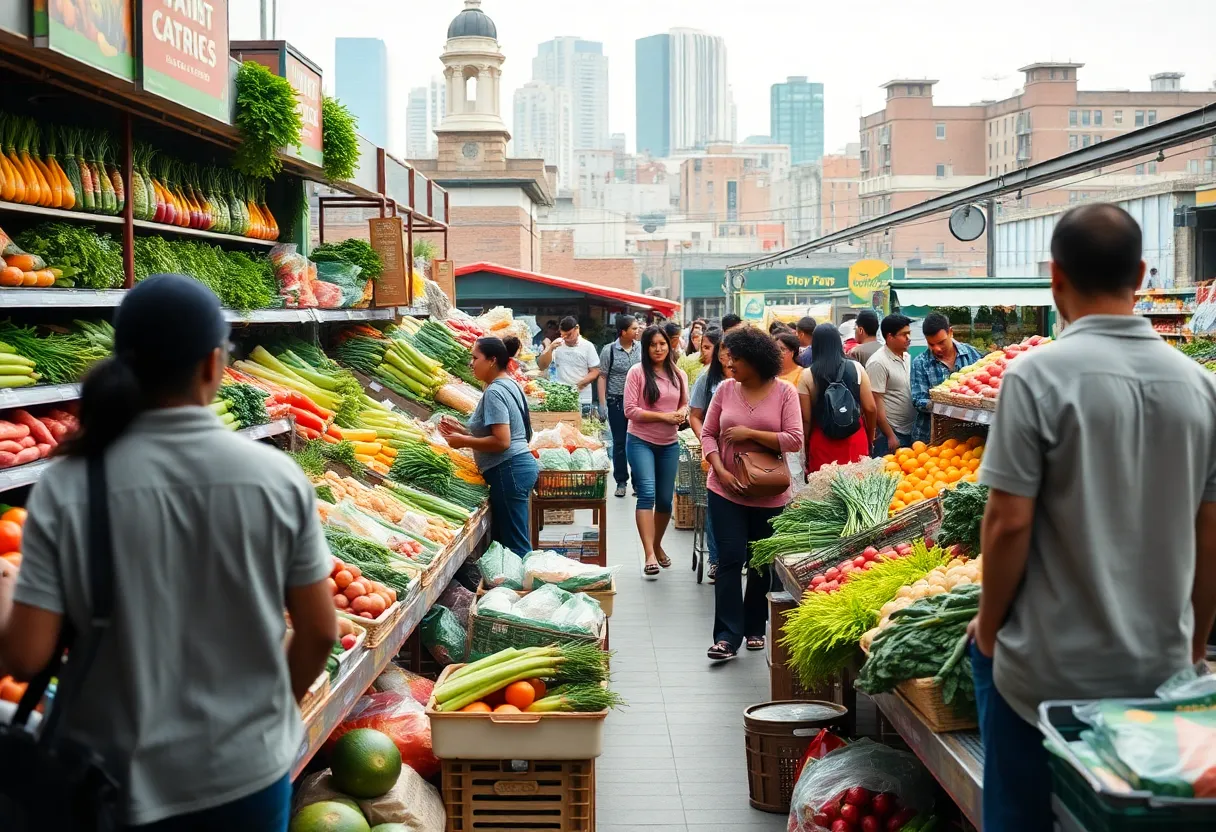News Summary
Mayoral candidate Zohran Mamdani proposes opening city-owned grocery stores in each of NYC’s five boroughs to combat rising food costs and food deserts. The initiative would cost $60 million, funded by redirecting tax breaks from private chains. While it has support from some, critics worry it may harm private businesses and lead to economic instability. Mamdani’s plan includes various strategies to keep prices low and improve food access, but the feasibility of such government-run stores in a large city remains in question.
New York City is currently witnessing a heated discussion around a proposal by mayoral candidate Zohran Mamdani, who seeks to launch city-owned grocery stores in an effort to alleviate rising food costs. Mamdani’s initiative aims to establish one grocery store in each of the city’s five boroughs, a strategic move designed to combat food deserts and high grocery prices affecting thousands of residents.
The estimated cost of this initiative is approximately $60 million. To fund the stores, Mamdani plans to redirect $140 million from tax breaks currently granted to private grocery chains. This financial strategy aims to ensure the affordability of groceries by offering city-operated alternatives to the private market.
However, the proposal has not been without its critics. Economic experts, including those from the Cato Institute and the Heritage Foundation, have expressed concerns regarding the efficiency of government-run grocery stores. They argue that these entities may lead to higher costs and potential food shortages due to a lack of competition within the market. E.J. Antoni, a chief economist at the Heritage Foundation, has specifically criticized Mamdani’s plan as “economically illiterate,” warning that it could drive private grocers out of the market, adversely affecting job availability and overall economic stability.
Business magnate John Catsimatidis has reminded the public of potential economic repercussions that Mamdani’s plan could bring, indicating that he might consider closing or relocating his grocery stores in Manhattan if such “socialist policies” are implemented. This serves as a cautionary note to the implications a government-run grocery system could have on the broader business landscape within the city.
Mamdani aims to enhance the feasibility of these stores by exempting them from rent or property taxes, intending this to result in lower prices for consumers. Additionally, he proposes collaborations with local farms, purchases at wholesale rates, and the establishment of centralized warehouses to streamline supply chain distribution and further minimize costs.
The divisive proposal has seen a mix of support and skepticism across the city. While some New Yorkers, including those from more affluent neighborhoods, embrace the idea of having public grocery options, others, including billionaire hedge fund manager Bill Ackman, worry that such initiatives could lead to significant job losses within the private sector and a decline in the number of wealthy taxpayers supporting city services.
The conversation around this proposal also touches on historical attempts at municipally-owned grocery stores in smaller towns, which have had varied success rates. In the context of New York City and its complex urban landscape, the feasibility of sustaining these grocery stores financially is questioned, especially given the notoriously slim profit margins found in grocery retail.
Research indicates that merely opening grocery stores does not automatically result in improved eating habits among residents living in food deserts, adding a layer of complexity to Mamdani’s plan. Nonetheless, his campaign emphasizes that the primary goal of the grocery plan is to enhance access to affordable food in an environment where grocery prices have significantly increased over the last decade, outpacing average income growth.
Overall, Mamdani positions his proposal as an experimental policy aimed at tackling food affordability, while acknowledging the criticisms and challenges it may face in implementation. As discussions around this initiative progress, the future of food access and economic impact in New York City remains a crucial topic of concern for residents and policymakers alike.
Deeper Dive: News & Info About This Topic
- The Atlantic: Public Grocery Stores in New York
- The Washington Post: New York’s Mamdani Grocery Stores
- The Economist: Should Cities Run Their Own Supermarkets?
- Eater: 99 Ranch Market Opening in Queens
- RetailWire: City-Run Grocers in NYC Discussion
- Wikipedia: Food Desert
- Google Search: New York City Grocery Stores Mamdani
- Google Scholar: Municipal Grocery Stores
- Encyclopedia Britannica: Grocery Store
- Google News: New York Grocery Stores

Author: STAFF HERE NEW YORK WRITER
The NEW YORK STAFF WRITER represents the experienced team at HERENewYork.com, your go-to source for actionable local news and information in New York, the five boroughs, and beyond. Specializing in "news you can use," we cover essential topics like product reviews for personal and business needs, local business directories, politics, real estate trends, neighborhood insights, and state news affecting the area—with deep expertise drawn from years of dedicated reporting and strong community input, including local press releases and business updates. We deliver top reporting on high-value events such as New York Fashion Week, Macy's Thanksgiving Day Parade, and Tribeca Film Festival. Our coverage extends to key organizations like the Greater New York Chamber of Commerce and United Way of New York, plus leading businesses in finance and media that power the local economy such as JPMorgan Chase, Goldman Sachs, and Bloomberg. As part of the broader HERE network, including HEREBuffalo.com, we provide comprehensive, credible insights into New York's dynamic landscape.





